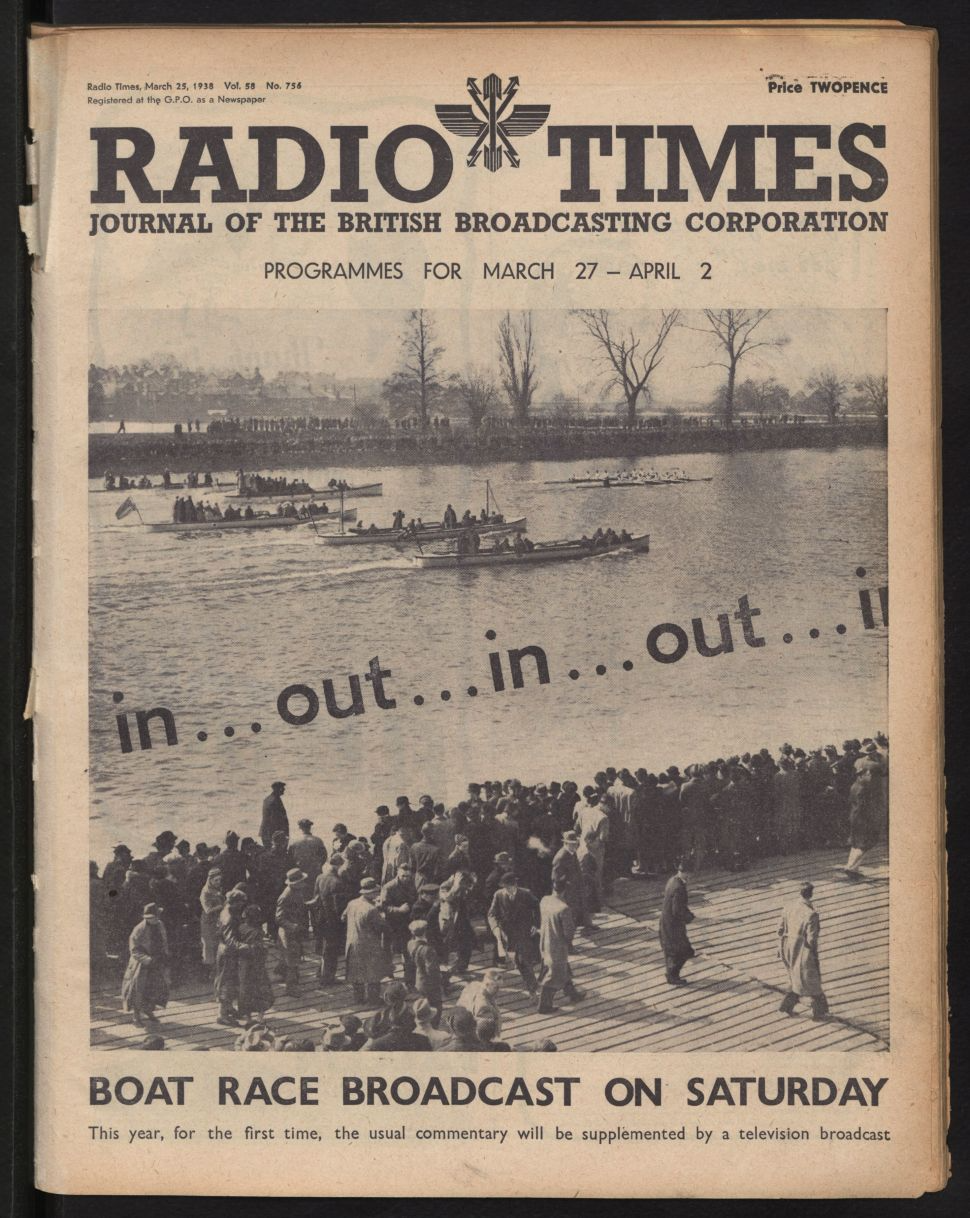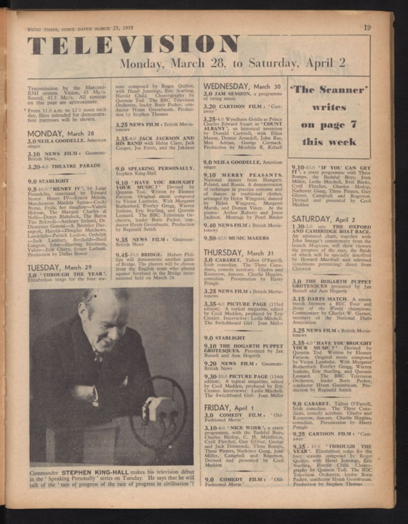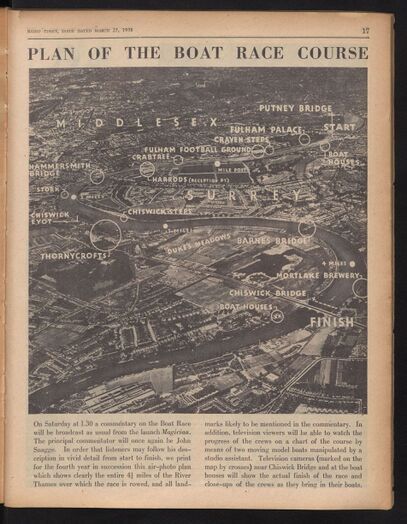The Boat Race 1938 (partially found footage of rowing race; 1938)
Issue 756 of Radio Times announcing the race would be covered live on radio and television.
Status: Partially Found
The 90th Boat Race between crews representing the Universities of Oxford and Cambridge commenced on 2nd April 1938. It occurred on the River Thames' 4.2 mile Championship Course and saw Oxford claim a 2-length victory, its second consecutive win, which subsequently reduced Cambridge's overall standings lead to 47-42. The event is also historic from a media perspective, as it became the first Boat Race to receive live television coverage.
Background
Though this race was the 90th running of the event, its inaugural staging occurred back in 1829.[1][2] However, it was only run intermittently until 1856, when it became an annual spectacle typically held at the 4.2-mile Championship Course in the River Thames.[3][2][1] Only the First World War had caused a temporary disruption by that point.[1] Since then, the Boat Race produced a firm rivalry between the Universities of Oxford and Cambridge,[4] with the latter having led overall 47-41.[1] However, Oxford finally broke Cambridge's 13-race winning streak in 1937 and aimed to reduce the overall gap.[5][6][7][1] For the majority of the British population, the main options for following the race were to attend it in person or listen to BBC Radio's coverage of it.[8] The event had been aired live on BBC Radio since 1927,[9][10] with John Snagge's familiar voice set to cover the race once more on the launch boat the Magician.[8] Alternatively, one could wait until the release of relevant newsreels from the likes of British Pathé and British Paramount News,[11][12] with films of the event having transpired since 1895.[10]
But for between 9,000-20,000 well-off households,[13][14] another choice was beginning to emerge.[15][8] On 2nd November 1936, the BBC had launched its high-definition Television Service.[16] It soon began to develop its outside broadcast capabilities, with its first "true" airing being the coronation of King George VI and Queen Elizabeth on 12th May 1937.[17][13][15] Thus, the BBC was not quite ready to cover the 1937 Boat Race, which emerged on 24th March.[6] A day prior, an event preview consisting of a discussion between Snagge and Tom Brocklebank was broadcast.[18] However, thanks to subsequent outside sports broadcasts like Wimbledon tennis and Arsenal vs Arsenal Reserves,[19] the BBC quickly expanded to cover events like the Calcutta Cup.[15] Rowing was also on the horizon, with the Head of the River Race first televised on 26th March 1938.[20][15] A broadcast of the Boat Race was therefore seen as inevitable, primarily helped by the corporation's pre-existing relationship with the sport.[21][15] Exactly whether the Boat Race deserved such extensive coverage has always been a subject of debate.[21] But for 1938, the television audience was predominantly upper-middle-class, making the coverage seemingly more relevant.[13] The fact numerous BBC personnel graduated from either university according to Snagge also probably contributed to the race's prioritisation.[21]
There were some limitations with this broadcast.[22][15][10] The BBC lacked the technological resources needed to cover the whole race live, especially on the Thames.[22][9] Hence, the majority of the broadcast was actually merely linked to Snagge's radio commentary, with Alexandra Palace having provided an animated chart containing two model boats.[22][8] The boats were moved by magnets to pinpoint the location of their real-sized counterparts.[8][22][10][9] The unique selling point was that the finish and aftermath were televised.[10][15][9] One was placed just before the boats crossed the finish line at Chiswick Bridge.[8][22] Two others were situated at the Boat House, to allow viewers to see both crews officially conclude the event.[8] Commentary would also subsequently switch over to Howard Marshall, with these television plans directly influenced by the weather conditions.[23][24][15] The event's direction was covered exclusively from the MCR 1 outside broadcast unit.[22]
Ultimately, the race did occur in windy conditions, but this was not enough to stop the broadcast from commencing.[7][22][9] Indeed, the television correspondent for the 3rd April 1938 issue of The Observer stated it was so successful and informative that even the viewers knew more about the race than the umpire.[25] With its inaugural broadcast wrapped up, the BBC resorted to expand its coverage the following year, which included the towpath, start sequence and the final half-mile of the race.[26] The broadcast revealed how fragile early coverage generally was, as the finish almost occurred without audio as the sound connection between Alexandra Palace and the outside broadcast unit was compromised by unsuspecting roadworkers.[15] It forced Bill Ward to link Snagge's commentary with the broadcast's final minutes.[15] A day after the 1938 race, Alick Hayes decided to create a programme detailing the history of the Boat Race from 1829 to 1938.[27] Called Rowing Blues, it was a 30-minute presentation conducted by Philip Dorte.[27] It was not until 1949 that the BBC finally had the capabilities needed to fully televise the race live.[22][9][10] Except for 1946 and ITV's 2005-2009 coverage,[28] the BBC has always subsequently televised the event.[9][10]
The Race
Heading into the race itself, Oxford (the Dark Blues) sought to maintain their 1937 momentum.[29][7] Analysis of the 1937 and 1938 Dark Blues crews indicate five remained on the team.[30] This included R.R. Stewart, J.P. Burrough, A.B. Hodgson, coxswain G.J.P. Merrifield, and crew president John Conrad Cherry.[31][30] Cherry had previously competed at the 1936 Summer Olympics in the coxed eights, where his crew finished fourth.[32] A. Burrough, T.B. Langton and coxswain T.H. Hunter all remained for Cambridge (Light Blues), Langton having become the crew's president.[30][31] Oxford's experience, weight (12.6 and a half stone compared to Cambridge's 12.13 and three-quarter stone)[30] and 1937 success made them the race favourites.[7]
The race occurred amidst heavy winds and rough waters.[7][11] The Light Blues won the toss and opted to put Oxford on the Middlesex bank, giving them access to the Surrey side.[7][11] Oxford initially made the better start,[11] but Cambridge quickly moved in front because of their 39 strokes per minute.[7] However, the Dark Blues soon recovered, taking a decent lead by the Mile Post.[7] This convinced the crew to attempt a move to Surrey, but this was blocked by a Light Blues push led by stroke Denis Eadie and rough waters.[7][11] By Hammersmith Bridge, Cambridge had reduced the gap to two seconds, as Oxford faced ever rougher waters.[7][11] A major push meant the Light Blues gained a quarter-length lead at Chiswick Reach, but a Hodgson-led Oxford regained it at Eyot and were a second ahead at Chiswick Steps.[7] The battle commenced within rough waters for some time due to an obstructive cruiser, though it appeared Cambridge were edging ahead in calmer waters.[7][11] Nevertheless, Oxford retained their slender lead and Hodgson's successful counters of Eadie's challenges meant they expanded the lead from between 1 and three-quarters to 2 and a half at Barnes Bridge.[7][11] A late push from an otherwise fatigued Light Blues did little to concern Oxford, who won their second consecutive race by two lengths.[7][11][1][29]
British Pathé considered the event as one that "would live long in the history of rowing",[11] while One Hundred and Fifty Years of the Oxford and Cambridge Boat Race compared it to the previous year's running and deemed Oxford had more advantages but were slightly less dominant than before.[29] Nevertheless, the race was considered well-run in spite of the poor conditions.[7] With this victory, the overall standings were reduced to 47-42 in Cambridge's favour.[1] Despite being deemed the favourites the following year, Oxford lost to Cambridge in 1939.[29][1] The event was then officially suspended from 1940 to 1945 because of the Second World War.[29][1] It resumed in 1946, and with the exception of 2020's cancellation due to the COVID-19 pandemic,[33] has always been held annually ever since.[1]
Availability
The 1938 Boat Race's television coverage occurred live, in an era where television output was seldom recorded.[34] For the BBC, regular recordings did not emerge until 1956, as videotape became a viable option.[35][34] However, it did conduct telerecording experiments during the late 1940s, including during its full coverage of the 1949 race.[36][37] As most sources cite the 1949 telerecording as among the earliest known instances,[36][37] it ultimately proves the previous 1938-1948 broadcasts are almost certainly permanently lost.[34] It means the 1937 preview and Rowing Blues are also irrecoverable.[18][27][34] Nevertheless, some newsreel footage of the 1938 race remains, including from British Pathé, British Paramount News and Huntley Film Archives.[38][11][12] Some photos can also be found online of the television process,[39][10] while Issue 756 of Radio Times helped document the broadcast.[23][24][8]
Gallery
Videos
Images
See Also
- The Boat Race (partially found television coverage of rowing races; 1938-present)
- The Boat Race 1927 (lost radio coverage of rowing race; 1927)
- The Boat Race 1949 (partially found footage of rowing race; 1949)
- The Oxford and Cambridge University Boat Race (lost footage of rowing race; 1895)
External Links
GA-Class Wikipedia article on the 1938 Boat Race.
References
- ↑ 1.0 1.1 1.2 1.3 1.4 1.5 1.6 1.7 1.8 1.9 The Boat Race detailing the results of each race. Retrieved 24th Jan '24
- ↑ 2.0 2.1 The Telegraph summarising the history and prestige of the Boat Race. Retrieved 24th Jan '24
- ↑ The Boat Race detailing the Championship Course. Retrieved 24th Jan '24
- ↑ Cambridgeshire Live summarising the importance of the race for both universities. Retrieved 24th Jan '24
- ↑ Archived The Boat Race report on the 1937 edition. Retrieved 24th Jan '24
- ↑ 6.0 6.1 Hear the Boat Sing detailing the story behind the Oxford crew's 1937 victory. Retrieved 24th Jan '24
- ↑ 7.00 7.01 7.02 7.03 7.04 7.05 7.06 7.07 7.08 7.09 7.10 7.11 7.12 7.13 7.14 Archived The Boat Race report on the race. Retrieved 24th Jan '24
- ↑ 8.0 8.1 8.2 8.3 8.4 8.5 8.6 8.7 Issue 756 of Radio Times previewing the race and designating where the BBC cameras were located at. Retrieved 24th Jan '24
- ↑ 9.0 9.1 9.2 9.3 9.4 9.5 9.6 BBC summarising the history of its Boat Race coverage, including how the 1938 event was televised. Retrieved 24th Jan '24
- ↑ 10.0 10.1 10.2 10.3 10.4 10.5 10.6 10.7 Science and Media Museum summarising the milestone Boat Race broadcasts. Retrieved 24th Jan '24
- ↑ 11.00 11.01 11.02 11.03 11.04 11.05 11.06 11.07 11.08 11.09 11.10 British Pathé newsreel of the race. Retrieved 24th Jan '24
- ↑ 12.0 12.1 British Paramount News newsreel of the race. Retrieved 24th Jan '24
- ↑ 13.0 13.1 13.2 The Ascent of Media From Gilgamesh to Google Via Gutenberg noting the television in the late 1930s was typically upper middle-class. Retrieved 24th Jan '24
- ↑ Science and Media Museum noting around 20,000 households had access to television sets by 1939. Retrieved 24th Jan '24
- ↑ 15.0 15.1 15.2 15.3 15.4 15.5 15.6 15.7 15.8 15.9 BBC Sport in Black and White detailing how the 1938 broadcast occurred and the near-ill-fated 1939 coverage (p.g. 27-29). Retrieved 24th Jan '24
- ↑ BBC on the launch of its high-definition Television Service. Retrieved 24th Jan '24
- ↑ BBC on its coverage of the coronation of King George VI and Queen Elizabeth, its first "true" outside broadcast. Retrieved 24th Jan '24
- ↑ 18.0 18.1 Issue 703 of Radio Times detailing a broadcast used to preview the 1937 race. Retrieved 24th Jan '24
- ↑ This Day in Football History on the Arsenal vs Arsenal Reserves broadcast. Retrieved 24th Jan '24
- ↑ Issue 755 of Radio Times detailing the coverage of the 1938 Head of the River Race (found on BBC Genome). Retrieved 24th Jan '24
- ↑ 21.0 21.1 21.2 Fields in Vision summarising the BBC's early prioritisation of key events, including the Boat Race. Retrieved 24th Jan '24
- ↑ 22.0 22.1 22.2 22.3 22.4 22.5 22.6 22.7 TV Outside Broadcast History detailing the limited coverage of the event prior to 1949. Retrieved 24th Jan '24
- ↑ 23.0 23.1 BBC Genome archive of Radio Times issues detailing the coverage of the race. Retrieved 24th Jan '24
- ↑ 24.0 24.1 Issue 756 of Radio Times listing the television coverage of the event. Retrieved 24th Jan '24
- ↑ 3rd April 1938 issue of The Observer reporting on Oxford's win and deeming the television coverage as a success. Retrieved 24th Jan '24
- ↑ Issue 808 of Radio Times detailing the BBC's coverage of the 1939 event (found on BBC Genome). Retrieved 24th Jan '24
- ↑ 27.0 27.1 27.2 Issue 757 of Radio Times detailing Rowing Blues (found on BBC Genome). Retrieved 24th Jan '24
- ↑ Cherwell noting ITV covered the race from 2005 to 2009. Retrieved 24th Jan '24
- ↑ 29.0 29.1 29.2 29.3 29.4 One Hundred and Fifty Years of the Oxford and Cambridge Boat Race summary of the race. Retrieved 24th Jan '24
- ↑ 30.0 30.1 30.2 30.3 One Hundred and Fifty Years of the Oxford and Cambridge Boat Race listing the crews of the race and their weights. Retrieved 24th Jan '24
- ↑ 31.0 31.1 One Hundred and Fifty Years of the Oxford and Cambridge Boat Race listing the crews' presidents (p.g. 50-52). Retrieved 24th Jan '24
- ↑ Archived Sports Reference detailing the results of the Men's Coxed Eights at the 1936 Summer Olympics. Retrieved 24th Jan '24
- ↑ BBC Sport reporting on the 2020 race's cancellation because of the COVID-19 pandemic. Retrieved 24th Jan '24
- ↑ 34.0 34.1 34.2 34.3 Web Archive article discussing how most early television is missing due to the lack of directly recording television. Retrieved 24th Jan '24
- ↑ BBC noting videotape recording was not possible at the corporation until 1956. Retrieved 24th Jan '24
- ↑ 36.0 36.1 Restoring Baird's Image noting the race broadcast was one of the first subject to a telerecording by the BBC. Retrieved 24th Jan '24
- ↑ 37.0 37.1 The History of Broadcasting in the United Kingdom: Volume IV: Sound and Vision noting that the broadcast was subject to a telerecording shown later that evening. Retrieved 24th Jan '24
- ↑ Huntley Film Archives newsreel of the race. Retrieved 24th Jan '24
- ↑ BBC providing a photo of the Oxford crew in front of the television cameras post-race. Retrieved 24th Jan '24


